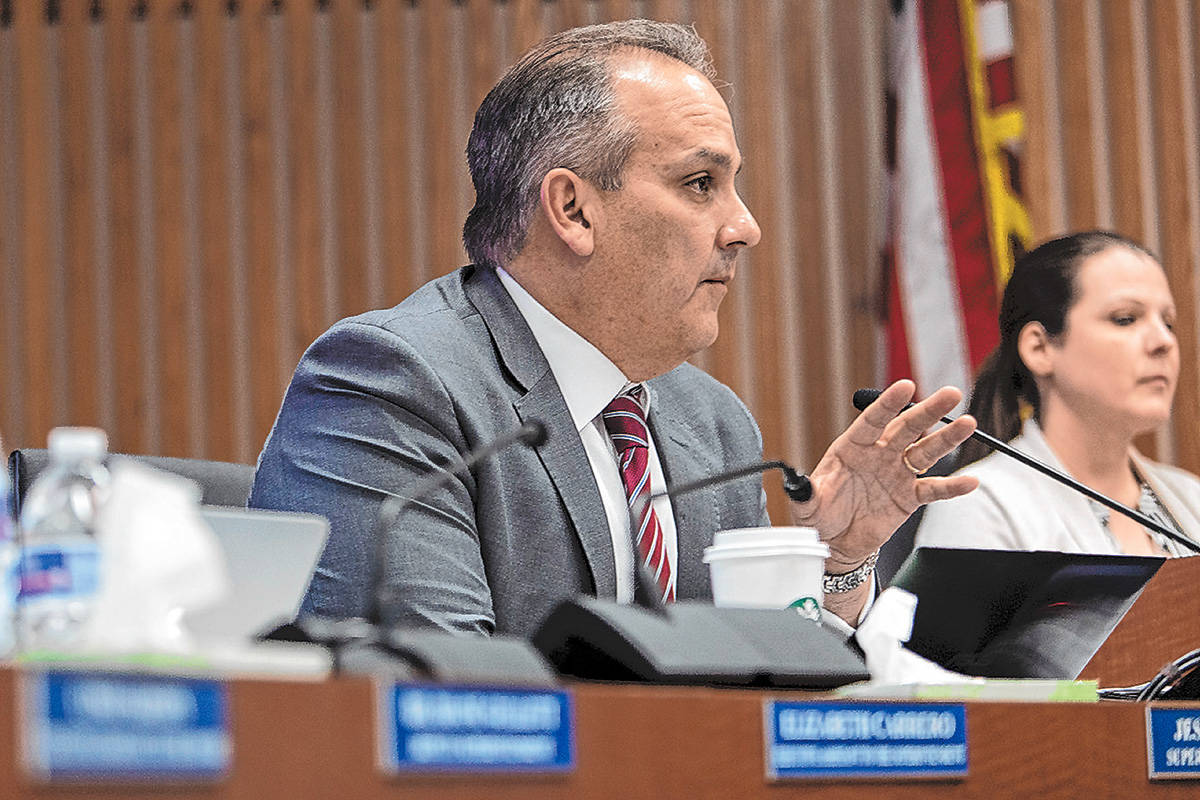Anti-racism policy presentation stirs anger at CCSD board meeting
National turmoil over how racial issues are taught in K-12 schools reached the Clark County School Board on Thursday night as outraged audience members assailed a presentation on the board’s developing of an anti-racism policy, forcing a brief recess of the meeting.
But district leaders and supporters of the policy drew a hard line between the goals of the district’s proposal and the controversy over discussions of race in the classroom that has consumed school districts elsewhere in the country.
“We teach the Nevada state standards when it comes to content,” Superintendent Jesus Jara said. “This is not about (critical race theory). This is about an anti-racism policy that the board has directed staff to work on.”
That policy is still unwritten, but its stated goals include providing a framework for how the district handles racially motivated discrimination, bullying or threats in line with a new state law, which added specific language on race to existing anti-bullying laws.
The policy’s introduction in early March predated much of the political furor over how teachers can discuss race with their students, an issue that has led to bills in numerous Republican-led states limiting such teaching.
In contrast, the Nevada Legislature also passed a law during its recent session mandating that districts offer lessons on the history and contributions of marginalized groups.
Advocates say the anti-racism policy being developed by the district is separate from curriculum considerations.
But the policy appears to have been swept into the larger firestorm as the timeline for its development stretched into months, with the the district now selecting members of the task force that will work on its language.
In the public comment portion of the meeting, critics tagged an anti-racism policy as another name for “critical race theory,” or CRT, an academic framework for examining how race relates to a variety of social issues that has recently been used by detractors as shorthand for teaching a divisive view of race to schoolchildren.
Many described the idea as telling children that they are victims or oppressors based on their skin color, and disparaging the United States and its history.
‘CRT is not our fight’
Others said they hoped to see unity as the guiding principle of any anti-racism policy, and referenced the work of Martin Luther King Jr.
“It is my hope (the task force) will be all races working side by side to help instill love, acceptance, appreciation for our unique cultures, talents and contributions to society,” speaker Angela Salazar said. “But anti-racism task forces all around the country are sourcing all American systems as systemically racist and built under an order of white supremacy.”
Supporters of the new policy said there are limits to this worldview: Love didn’t end slavery, for example, or prevent present educational inequities in the district, said Kamilah Bywaters of the Las Vegas Alliance of Black School Educators.
And not giving students a fuller picture of the world puts them at a disadvantage after graduation, said Shelbie Lynn Swartz, a district alum who described her experience of using insensitive language in ignorance of its impact on others.
Still others emphasized that a debate over critical race theory wasn’t relevant to the discussions on the district’s new policy, including Jshauntae Marshall of 1865 No Racism in Schools, a group founded in the wake of racist threats at Arbor View High School in 2018, whose members originated the push for the anti-racism policy earlier this year.
“CRT is not our fight,” Marshall said. “Whatever other people want to fight about as it pertains to the curriculum or our personal opinions about the curriculum will not negate the work that will be done for anti-racism.”
The tense meeting was punctuated by jeers and insults from members of the audience from its opening moment, when Board President Linda Cavazos announced trustees were wearing a rainbow of colors to represent the LGBTQ community for Pride month.
Cavazos warned the crowd that officers would begin removing disruptive individuals from the boardroom, but an argument eventually erupted between supporters and detractors of the new policy, necessitating a brief recess and evacuation of the trustees.
Speaker Tonya Walls said the board needed to have better enforced its policies of decorum. By not doing so, it failed to ensure the safety of audience members who had to listen to the needling, Walls said.
“You played out here what our students of color experience every day in your school houses,” she said.
Task force work
The district is still in the process of identifying members of internal and external task forces that will jointly advise district officials on the policy, with no timeline yet set for writing and presenting proposed language.
Staff representatives to the internal task force have been named, according to Chief College, Career, Equity, and School Choice Officer Mike Barton, and four outside experts have been identified to help guide the work, including attorneys Maree Sneed and Donna Mendoza Mitchell, Howard University professor Shawn Joseph and Compton, California school board president Micah Ali.
Community members who wish to sit on the external task force can fill out an interest form through July 2. The district has received 227 responses from both individuals and organizations, said Assistant Superintendent Sam Scavella. The number will be whittled to 25.
Scavella acknowledged a district misstep in not posting the form in Spanish to start — an error that has now been rectified, he said.
As of June 11, more white respondents had expressed interest in the task force than any other ethnic group, according to the presentation.
Asked by Trustee Irene Cepeda if the task force had student representation, Barton said the district had received expressions of interest from some district students, but didn’t specify how many.
Future timeline
Trustee Danielle Ford asked if a deadline could be set for the policy, suggesting 90 days as a target. But Jara said he believed it would be irresponsible to commit to doing the work in a month or two with another school year coming up.
The board will receive another update on the policy work in August.
Akiko Cooks of 1865 No Racism in Schools said the group had heard an estimate of about 18 months for the work to be completed, but has been pushing for a faster timeline.
Cooks said the task force must be chosen with an eye toward diverse representation.
The group’s list of demands include a provision that the policy be revised every two years, leaving open the possibility that it could one day grapple with questions of race in the curriculum, Cooks said, though that’s not the group’s present goal.
For now, in addition to the priorities of defining incidents of racism, Cooks said she’d like to see the policy include concepts of restorative justice so that students would understand why their actions and language may be hurtful.
“I want us being intentional on educating the student about what’s wrong with that instead of just suspending or expelling them,” Cooks said. “I would hate that we have an incident, and it’s still not addressed even with the policy.”
Contact Aleksandra Appleton at 702-383-0218 or aappleton@reviewjournal.com. Follow @aleksappleton on Twitter.























